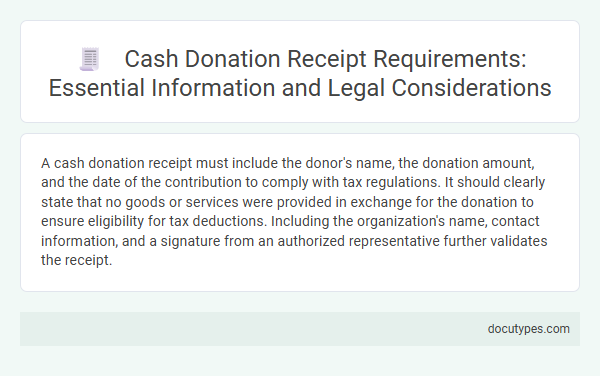A cash donation receipt must include the donor's name, the donation amount, and the date of the contribution to comply with tax regulations. It should clearly state that no goods or services were provided in exchange for the donation to ensure eligibility for tax deductions. Including the organization's name, contact information, and a signature from an authorized representative further validates the receipt.
Introduction to Cash Donation Receipts
Cash donation receipts provide official proof of a monetary gift made to a nonprofit organization. These receipts are essential for both donors and organizations to ensure transparency and compliance with tax regulations.
- Official Documentation - A cash donation receipt serves as formal evidence that a donor has contributed funds to a qualified charitable entity.
- Tax Deduction Eligibility - Donors require receipts to claim tax deductions on their income tax returns accurately.
- Compliance with Regulations - Nonprofits must issue proper receipts to adhere to legal requirements set by tax authorities.
Issuing a clear and accurate cash donation receipt supports accountability and encourages continued charitable giving.
Legal Framework Governing Donation Receipts
Cash donations require a receipt that complies with the legal framework established by tax authorities to ensure donor eligibility for tax deductions. Such receipts must include specific details like the donor's name, donation amount, date, and the organization's official information.
Legal regulations often mandate that donation receipts be issued promptly and contain a statement confirming no goods or services were exchanged for the contribution. Maintaining accurate and thorough donation records helps organizations meet compliance standards and supports transparency in charitable giving.
Mandatory Information on Cash Donation Receipts
A receipt for cash donations must include the donor's name and the exact amount given to ensure proper documentation. It should clearly state the date of the donation and the name of the organization receiving the funds. Your receipt must also specify whether any goods or services were provided in exchange for the donation to comply with legal requirements.
Donor and Recipient Identification Requirements
What kind of receipt is needed for cash donations to ensure proper donor and recipient identification? A receipt must clearly display the full name and contact details of both you and the organization receiving the donation. This information helps verify the legitimacy of the donation for tax and record-keeping purposes.
Date and Amount Specifications
Receipts for cash donations must clearly specify the exact date of the transaction and the precise amount donated. Proper documentation ensures compliance with tax regulations and provides valid proof for both donors and charities.
- Receipt Date Requirement - The receipt should include the exact date when the cash donation was received to establish a clear timeline.
- Accurate Amount Disclosure - The receipt must state the exact amount of money donated to verify the contribution value.
- Legal Compliance - Including accurate date and amount information helps satisfy tax authority requirements and supports donor tax deductions.
Statement of Goods or Services Provided
For cash donations, a receipt must clearly state whether goods or services were provided in exchange. This statement helps donors understand the tax deductibility of their contribution.
- Statement of Goods Provided - Describes any tangible items donated to the donor as part of the transaction.
- Statement of Services Provided - Details any services rendered to the donor related to the donation.
- Value Disclosure - Specifies the estimated fair market value of goods or services to inform the donor's tax reporting.
Tax Deductibility Clauses
A receipt for cash donations must include specific details to qualify for tax deductibility. The document should clearly state the donor's name, donation amount, date of contribution, and the charity's tax identification number.
Tax regulations require acknowledgment of donations over $250 to include a statement regarding any goods or services provided, affecting deductible amounts. Properly formatted receipts ensure compliance with IRS rules and facilitate donors' tax deduction claims.
Recordkeeping and Retention Policies
For cash donations, a receipt should include the donor's name, the donation amount, and the date of the contribution. Clear recordkeeping is essential to verify each donation for tax and audit purposes. Retention policies recommend keeping these receipts for at least seven years to comply with IRS guidelines.
Common Mistakes in Issuing Cash Donation Receipts
| Aspect | Details |
|---|---|
| Receipt Type Required for Cash Donations | Official donation receipt must clearly state the donor's name, donation amount, date, and organization's details. |
| Common Mistake: Missing Donor Information | Receipts lacking complete donor details may lead to rejection for tax deduction claims. |
| Common Mistake: Not Including Date of Donation | Incorrect or missing date affects the validity period for reporting and claiming purposes. |
| Common Mistake: Absence of Organization's Official Details | Omitting the nonprofit's name, address, and registration number can invalidate the receipt. |
| Common Mistake: No Signature or Authorization | Receipts without authorized signatures or official stamps lack credibility and legal recognition. |
| Common Mistake: Using Generic or Handwritten Receipts | Generic receipts often miss essential data fields; professionally printed or digital receipts are preferred. |
| Best Practice | Use standardized receipt templates with all required data to ensure compliance and donor confidence. |
What Kind of Receipt Is Needed for Cash Donations? Infographic

